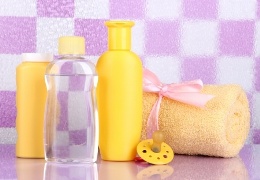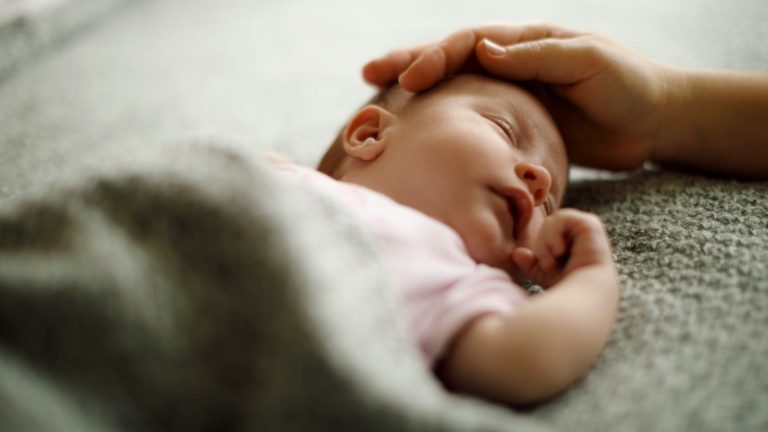As adults, we can make our own choices about whether it’s worth spending a little more on certain types of skincare, or whether we want to check ingredient lists carefully before choosing what will be absorbed through our skin. Our children rely on their parents for these decisions, and sometimes that can feel like a heavy weight on our shoulders! It can be hard to negotiate the vast range of available products for baby care – or to know what to get and where to get it from; what’s safe and what’s worth paying extra for. Let’s take a look at some of the common items you need and what you might need to look out for.
Our skin is our body’s largest organ, so it makes sense that what we put on our skin will be absorbed and have much further implications than just how it affects our skin itself. A baby’s skin is also delicate – thinner than an adult’s – so there is less capacity for young skin to filter what is applied to it. Proportionately, babies’ skin is a larger surface area to weight ratio than an adults, their immune systems are less developed than an adult’s and all of their organs and body functions are still developing. These are all reasons you may wish to consider carefully what you are willing to apply to your baby’s skin, and to do a bit of research on some common ingredients and what affects they can have.
Equipping yourself with required products
There is so much to prepare during pregnancy, it can be hard to get around to it all. Baby can sometimes arrive much earlier than their due date – so even if you thought you had time to be prepared, that time can be whisked away from you! When possible, try to make the choices on your baby care products before birth.
It is likely that as a new parent, you will be given many opportunities to sample products. These will be very convenient if you have nothing else to hand. If you are keen to know what is in everything you place on baby’s skin, have your chosen alternative ready to go before baby’s arrival and the sample packs won’t seem quite so inviting.
When baby comes, it can be a hard ask to get out of the house yourself to pick up certain items. If you’re caught without something you need, you may have willing helpers drop by, and you can arm them with a list of things required. You can also add baby care items to your online grocery shopping order, and have them delivered to your door – saving time and energy in those precious first weeks!
Labelling on baby care products
Just because it says it is natural, organic, hypo-allergenic or best for baby, such marketing does not necessarily mean… well, anything! Check the ingredient list. Take a list along with you of chemicals to look out for. If in doubt, choose something more natural, with fewer ingredients. Avoid fragrances and colours.
What are we likely to need?
Shampoo
- Some babies are born with quite a head of hair. Baby-specific shampoos to look out for will be as natural as possible. You may find ‘no tear’ type shampoos are better for the eyes but more irritating to the scalp. If so, try a natural product-based shampoo and do your best to keep it out of baby’s eyes when you wash their hair.
Cotton balls/pads
- In those first days after birth, baby will need to have his/her eyes wiped gently with water applied to a cotton ball or pad – look for items made of 100% cotton. One pack should suffice – remember to use a different pad for each eye, as conjunctivis (sometimes contracted in baby’s journey through the birth canal) can spread very easily from one eye to the next.
Baby body wash or soap
- Gentle, gentle, gentle with these products – the less ingredients the better, and look for something with no fragrance added. A lot of bathing baby can be done in plain, warm water – but occasionally, after a particularly dirty nappy or large vomit, it is nice to have something to hand that will more effectively clean the mess off baby’s skin.
Moisturiser/Oil
- Baby’s skin can change quickly – with dry patches, baby acne and similar normal hormonal changes affecting the skin. In addition, many babies have patches of eczema or cradle cap. A very natural product such as almond oil is useful to have to hand, and doubles as a lovely massage oil for baby (or mummy!) massage. If there is a history of almond allergy in the family, choose another natural oil. Keep an eye on baby’s skin and if anything looks concerning, be sure to show your midwife or GP.
Nappies
- Choosing between disposable and cloth is largely an option of personal preference. To make an informed decision, you may wish to look into the pros and cons of disposable versus cloth, however it is important to consider the impact of each on your baby’s skin. With cloth nappies, you can choose to use 100% natural fibres against your baby’s skin. You can choose what you wash your nappies in – and whether there will be any chemicals involved in this process at all. Disposable nappies are treated with chemicals and involve putting plastic next to baby’s skin, and some are treated with dyes.
Nappy rash cream
- Many babies will experience at least a little red rubbing, if not a more serious rash on their bottom. To ease their comfort, have a nappy rash cream to hand – though exposing the rash to some sunlight and having a bit of nappy-free time when possible often helps tremendously. Look for the most natural product you can find.
Wipes
- If you would really like to control the amount of toxins and chemicals that come into contact with your baby, then you need to think carefully about the wipes you use. A newborn can need ten or more nappy changes a day – even if you are only using wipes for baby’s bottom (which face it, is unlikely) this is a lot of exposure to what is in your chosen wipes. Some brands of wipe however have very few, safe ingredients. And don’t forget – you can make your own wipes very easily. Cut up an old sheet or buy some inexpensive cotton cloths (dish cloth rolls work well). Fill a flask of warm water in the morning and put it on your change table – a little warm water applied to the cloth will work well in most instances.
Laundry Detergent
- If you’ve typically put in your supermarket trolley ‘whatever’s on special’ when it comes to laundry detergent, now is the time to consider whether you wish to wash baby’s clothes in a different type of detergent or not. If you would like to keep baby’s clothes chemical-free, even if only for a certain period of time, you could wash their items seperately with a natural detergent.
Other baby care products to consider purchasing
- A soft-bristled baby brush
- A digital thermometer
- Small baby nail clippers or scissors
- Baby-specific sunscreen.
Choosing these items can seem daunting when you’re standing in front of all the options. Decide what is most important to you – you may not choose to carefully consider every product – but you may decide that the most used product or the products that will have greatest exposure to baby’s skin are the ones you wish to keep as natural as possible. A little research and you will be armed with the knowledge you need to make the best decisions for your family.
This post sponsored by Countdown.





